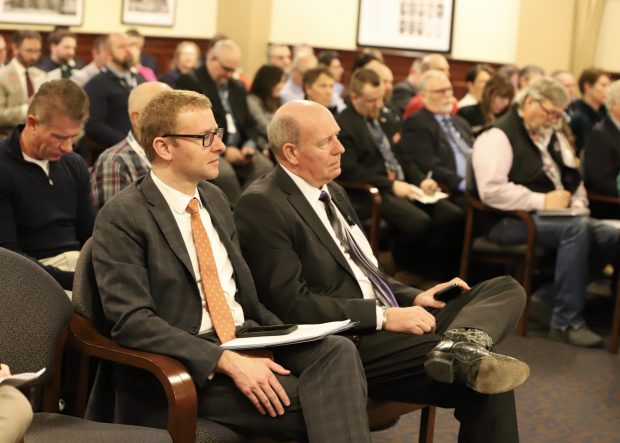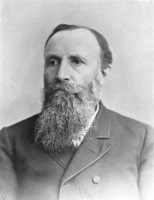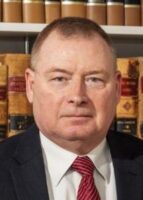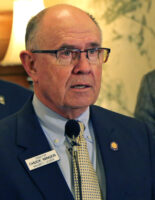Nearly two decades after the Idaho Supreme Court ruled that the Legislature was shirking its constitutional duty to fully fund public school facilities, lawmakers recently took a major step to address the problem.
On Friday, Gov. Brad Little signed House Bill 521, which the Republican governor co-authored with a handful of powerful GOP legislators, including House Speaker Mike Moyle. Under the sweeping legislation, the state will spend an additional $1.5 billion over the next decade to help fund building construction and maintenance.
While tidying up one constitutional conundrum, however, the bill sponsors may have created another: HB 521 itself could be unconstitutional. That’s because it doesn’t only address school facilities; it also cuts income taxes, eliminates a school election date and even gives the state’s public defender’s office a funding boost, among other things.
Why does the bill’s broad scope matter? The Idaho Constitution explicitly prohibits legislation that embraces more than one subject.
The so-called “single-subject” rule — an original provision of the 1890 state Constitution — has been sparingly applied by courts throughout Idaho history, as judges have given the Legislature broad discretion to decide what’s considered one subject. And it would take a lawsuit to challenge HB 521, which seems unlikely considering the widespread support for addressing public schools’ urgent facilities needs.
But it’s not the first bill in recent years that has stretched the limits of the single-subject rule, and lawmakers in recent weeks have bridled at the trend.
In order to get a “nice shiny” piece of a bill that they want, lawmakers have to sign off on things they don’t want, Senate Majority Leader Kelly Anthon said during a committee hearing last month.
“I would say the majority of the Idaho Senate is tired of that,” said Anthon, R-Burley.

Does a ‘compromise bill’ violate the single-subject rule?
The governor’s staff was expecting compromises on his blockbuster facilities plan from the get-go.
In early January, as Little was preparing to deliver his State of the State address to kick off the legislative session, his budget chief, Alex Adams, told reporters that the details of the facilities plan would be ironed out in the coming months. “We’re coming to the Legislature saying, ‘Let’s work together.’”
When the bill was officially introduced a month later, it wasn’t just a bill to fund school facilities.
“I want to emphasize that this is a tax cut,” Moyle told a House committee when introducing HB 521 in February. “We’ve worked together to try to find a solution to the issues, the problems ahead of us,” with “each side giving and taking a little bit. I think we’ve found a good compromise bill.”
It’s possible that delivering $1.5 billion in school facilities funding required compromises — such as eliminating an opportunity for schools to hike property taxes — in the ultraconservative Legislature. But a collection of tradeoffs in one sweeping bill is precisely what the single-subject rule was designed to prevent.
During Idaho’s constitutional convention in 1889, Boise judge John T. Morgan explained the reasoning behind the rule:
Illinois inserted a similar provision in its constitution to deter “logrolling,” a scheme in which the legislature would “embrace a dozen bills in one act, by getting together and agreeing upon what bills they would pass” and adopting “a whole batch of them” in an “omnibus bill.”

“In that way they would get through the legislature that which never ought to have been enacted into statute, because they would get such a combination that nobody could resist it,” said Morgan, who later served as chief justice of the Idaho Supreme Court.
In subsequent decades, the Idaho Supreme Court was tasked with interpreting the short provision, which simply states that “every act” adopted by the Legislature “shall embrace but one subject.” Here’s what courts have ruled, as summarized by the Idaho Constitution Code Book:
- Pioneer Irrigation District v Bradbury (1902) — If the provisions of a bill “all relate directly or indirectly” to the same subject that have a “natural connection,” they may be united in one act.
- Moore v. Banks (1923) — The purpose of the single subject rule is to prohibit “hodgepodge” or “logrolling” legislation that unites subjects “diverse in their nature, and having no necessary connection.”
- Boise City v. Baxter (1925) — “Subject,” as used in the single subject provision, is “to be given broad and extended meaning so as to allow legislature full scope to include in one act all matters having logical or natural connection.”
- AFL v. Langley (1946) — “A statute must indicate a common object, and all parts” of a statute “must relate to and tend to support and accomplish the indicated object.”
In other words, legislation can’t address a hodgepodge of diverse subjects. But the Legislature has discretion to decide which objectives can be couched under one subject.
The Legislature currently is considering seven followup bills to HB 521 that could make major changes. It’s unclear whether any will pass.
But in its current form, HB 521:
Creates the school modernization facilities fund. Each year, the state will direct $125 million in sales tax revenue to the bonding fund. Districts will get a share of $1 billion that will be divided through an attendance-based formula. Districts could take their share in a lump sum next fiscal year or in annual installments over the next decade.
- School districts created before statehood — Boise, Lewiston and Emmett — will have their shares of the fund capped at $40 million. Only the Boise School District would otherwise receive more than $40 million.
- The State Board will have to submit to the Legislature an annual report on the school modernization facilities fund.
Requires a broad range of conditions for the facilities funding. To qualify for the school modernization facilities funding, districts will have to attest:
- That they’ll submit to the state a 10-year facilities plan.
- That they’ll comply with the state’s anti-Critical Race Theory law.
- That they won’t require job applicants to sign written “diversity statements.”
Sets minimum school days. To qualify for the school modernization facilities funds, school districts also will have to attest that they’ll abide by minimum instructional days and teacher contract days. HB 521 directs the State Board to establish the minimums by August.
Adds to school district bond/levy tax relief funds. An estimated $25.5 million annually will be added to the school district facilities fund. This fund was created last year by House Bill 292, a sweeping property tax relief law that directs state sales tax revenue for school districts to pay down local bonds and levies.
- The bill also eliminates the bond levy equalization support program. This program directs state lottery revenue to qualifying districts — often economically disadvantaged — to offset the local costs of bonds.
- The bill redirects those funds — an estimated $50 million annually — to the school district facilities fund.
Cuts income taxes. Tax rates for individuals and corporations go from 5.8% to 5.695%. This tax cut will cost the state an estimated $59 million annually.
Restructures State Board appointment authority. The governor, rather than a majority of board members, will appoint the State Board’s president as well as the executive director for the office of the State Board.
Removes the August election date for school districts. This eliminates a school bond and levy election date for the second consecutive year. Districts now can only pose bond and levy measures in May or November.
Increases sales tax distributions to the state public defense fund. This fund stems from the Legislature’s decision in 2022 to shift public defense services from counties to the state. HB 521 directs an additional $3 million annually to the fund.
‘Taxation’ ties HB 521 facets together, supporters say
Ask a bill sponsor whether their legislation satisfies the single rule and you’ll likely get a wry smile.
“It’s a good tax bill that does good things for schools,” Moyle, R-Star, said of HB 521. Little has acknowledged that it might stretch the limits of the rule. “But it almost always gets stretched in the Legislature,” he told reporters in February.
HB 521 isn’t the first bill in recent years to raise single-subject concerns. Last year’s House Bill 292 included various property tax relief mechanisms while also eliminating school districts’ most valued election date, the March election. The lone bill from 2022’s special legislative session promised schools additional funding along with delivering income tax cuts and rebates.
“The Legislature has gotten into the practice of throwing stuff together that doesn’t belong together, and unless you challenge them, then it goes right on through,” Jim Jones, a former Idaho Supreme Court justice and past attorney general, told Idaho Education News.
As for HB 521, Little said there’s a “golden thread that ties everything together.” He was referring to a few paragraphs at the beginning of the bill that’s known as the legislative intent.

“The Legislature finds that the burden of taxation on the people of Idaho is too great,” the legislative intent reads. It goes on to say that schools’ reliance on property taxes along with a relatively high income tax rate are the “primary drivers” of this burden. And HB 521’s aim is to reduce the “need and likelihood” of schools resorting to property tax hikes by restricting their opportunities to do so, directing them additional money for facilities and “ensuring accountability for the same.”
Would that explanation satisfy a panel of judges weighing the bill against the constitution? “I don’t think the courts are that dense,” Jones said. “They’ll look at it and see what the real substance of the thing is.”
The “burden of taxation” justification is reminiscent of legal arguments surrounding House Bill 1, the special session legislation from two years ago. Lawmakers at the time asked former Attorney General Lawrence Wasden’s office to weigh in on single-subject concerns.
HB 1 “did not appear to be vulnerable” to a court challenge under the single-subject rule, former chief deputy attorney general Nicole McKay wrote in a legal opinion. While the bill mixed income tax provisions with sales tax provisions, “all provisions pertain directly to, and have a necessary connection with, the core subject of taxation.”
Is there a current attorney general opinion?
Lawmakers contemplating the latest bill have bemoaned the absence of an official opinion from Attorney General Raúl Labrador.
“Although I’m an attorney, I’m not the state’s attorney, who certainly has a duty to provide a written opinion on whether or not this” satisfies the single-subject rule, Sen. Geoff Schroeder said during a committee hearing in March.

Labrador’s spokesman, Dan Estes, said the attorney general hasn’t issued an opinion on HB 521 because no one has asked for advice on the bill.
Labrador has made clear to lawmakers, however, that he’s resistant to publicly analyzing constitutionally fraught bills. Estes recently told the Idaho Capital Sun that official opinions identifying constitutional concerns in pending legislation “can and will undermine” the state’s ability to defend a bill if it becomes law and faces a court challenge.

Lawmakers instead relied on their own lawyerly chops to analyze HB 521. Schroeder, a Republican city attorney and prosecutor from Mountain Home, said he wrestled with the single-subject question, but he was satisfied after reviewing the case law. He referred EdNews to the Pioneer Irrigation District v. Bradbury and Boise City v. Baxter decisions.
Senate President Pro Tem Chuck Winder said courts have been “lenient” in applying the single-subject rule and taxation is a “broad issue” that “covers everything we do” when money is involved.
“It would be an interesting case to take to the Supreme Court,” Winder, R-Boise, told reporters earlier last month. “It’d be very difficult to prove it wasn’t a single subject, even though it has different, seemingly unrelated issues.”
Other lawmakers decided the legislation didn’t pass constitutional muster. Half a dozen senators raised the single-subject rule during a floor debate last month. “This bill has too many facets to it,” said Sen. Cindy Carlson, R-Riggins. “There’s some really good pieces to this legislation that I love…I believe all of us are torn, and I’m torn enough that I will be voting ‘no’ based on the fact that, it is my belief, it’s unconstitutional.”
Lawmakers ‘tired’ of omnibus bills
It would take a lawsuit to sort out whether HB 521 satisfies the single-subject rule. And even those who believe the bill is unconstitutional doubt a court challenge will occur.
“If this bill passes the single-subject rule, then there is no single-subject rule,” House Minority Leader Ilana Rubel, D-Boise, told reporters last month. “But probably nobody will sue, so it probably won’t come to a head.”
After all, a lawsuit would jeopardize millions of dollars for school districts with crumbling buildings and low success rates in bond elections. “The only saving grace for the Legislature might be that anybody with a dog in the fight would say, ‘Well, we really do need the school facilities provisions, even though they’re not that great,’” Jones said.

But Statehouse debates on HB 521 showed that resentment for the omnibus policymaking trend has been simmering. Sen. Jim Guthrie, R-McCammon, said he was “tired of it,” despite acknowledging that his opposition to the facilities funding bill would be difficult to justify with his constituents.
Bills spanning dozens of sections of law are confusing for citizens and lawmakers alike, said Sen. Ali Rabe. And they force legislators to vote for something they don’t like in order to get something they do.
“We’ve been doing things this way for a few years, and I am just tired of it,” Rabe, D-Boise, said on the Senate floor last month. “I believe it’s time for us to take a stand on this type of lawmaking.”
